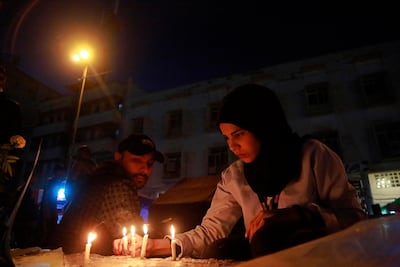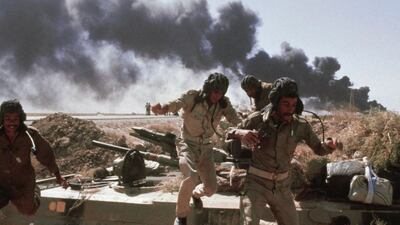Leaked Iranian intelligence documents show that 16 years after the US-led invasion toppled Saddam Hussein, Tehran remains obsessed about American influence in Iraq.
The rivalry between the two countries has defined Iraq’s politics since the 2003 invasion that toppled the former Iraqi president. A summary of the documents, which were leaked to the New York Times and The Intercept, show a lack of understanding in Tehran about US domestic politics and the rejection of any major troop presence on the ground.
One cable from an Iranian intelligence agent to his superiors in Tehran said atrocities committed in 2014 by an Iranian-backed Shiite militia against Sunni civilians were an invitation to the US to come back.
Sunni militants who had fought US forces, the cable said, wished “that not only America, but even Israel, would enter Iraq and save Iraq from Iran’s clutches.”

After spending $2 trillion and losing 4,500 US soldiers, as well as the thousands of personnel who survived with horrific injuries from roadside bombs and other attacks, the US has little desire to come back in a dominant role.
Iraq is a toxic political issue in the US, still resonating in the current election campaign although without the invasion Saddam or one of his two notorious sons could still be in power.
The former US vice president Joe Biden, a Democratic front runner, ignited controversy last month by saying he came out against invasion as soon as it started, although Mr Biden was among the 77 senators who had authorised it.
According to Pew Research Centre polling, US support for the use of military force in Iraq as the invasion began in March 2003 was running at 71 per. By March last year, only 43 per cent of Americans said the invasion was the right decision.
Under the Barack Obama presidency, US forces pulled out in 2011, redeploying in recent years to fight ISIS in a tacit alliance with Tehran, which, the documents show, vigorously spied on the US presence.
The US was also concerned with the Iranian influence and presence, seeking to prevent the crossing of members of the Badr Corps, an Iraqi Shiite militia based before invasion in Iran, into Iraq.
The US, however, did not have enough troops to control the 1,500 km border.
The Badr Corps, later named the Badr Organization eventually became Iran’s main military tool in Iraq, playing a significant role in the crackdown on the current uprising.
But it was Iranian tutelage that became the target of protesters’ wrath in the Iraqi uprising, which erupted on October 1. Earlier this month, security forces killed at least one youth among demonstrators who had tried to storm the Iranian consulate in Karbala.
In Najaf, demonstrators renamed the ‘Imam Al Khomeini’ boulevard ‘Revolution Street’.
US Secretary of State Mike Pompeo said on several occasions that he deplored the crackdown, as well as the kidnapping of protesters.
But President Donald Trump thanked the Iraqi authorities for help in the raid that killed ISIS leader Abu Bakr Al Baghdadi last month.
Mr Trump did not refer to the crackdown in which the authorities and Iranian-backed militias killed more than 300 people and wounded thousands.
For US Democrats hoping to regain the presidency next year, Iraq was an unconstitutional war, and although it is not a top issue, democratic candidates have used Mr Biden’s vote, when he was senator, for the invasion to undermine his foreign policy credentials.
Many Republicans regard the toppling of Saddam as ideologically motivated, in contrast with decades of pragmatic foreign policy forged in the Cold War era.

In the run up to the 1990-91 Gulf War, the late US president, George H W Bush, met with Christine Helms, a veteran scholar specialising in Iraq and Saudi Arabia.
Ms Helms had conducted research in Iraq during the eight year war with Iran, writing a book on Iraq and its geopolitical position as “the eastern flank of the Arab world”.
She warned that toppling Saddam would open a ‘Pandora’s box’. Mr Bush listened to the advice of Ms Helms and others, and stopped short of toppling Saddam, although he called on Iraqis to rise up against the late dictator.
Ms Helms kept to her position as George W Bush prepared to invade Iraq after the September 11 attacks.
She was resented by, and in turn resented, Ahmad Chalabi, the Iraqi mathematician turned politician who organised the Iraqi opposition to Saddam and played a significant role in convincing the US to invade.
Once in power in Iraq, Chalabi sought for Iraq to have a balanced relationship between Washington and Tehran.
He was ostracised, then made a political comeback, as some US administration officials regarded him as a double agent: funded by the US, but serving Iran.
Chalabi saw himself as an Iraqi nationalist. A consummate interlocutor, he argued that Iraq needed the US for reconstruction and to become a prosperous democracy along the model of Western Europe after WW2.
He understood that without any diplomatic effort to keep Iran at bay, Tehran can wreak havoc. He made this clear during an off-record interview in December 2006 during a visit to Damascus, where he met President Bashar Al Assad.
Chalabi was not a fan of the Syrian dictator, or his father Hafez Al Assad. In the interview he contemptuously criticised Hafez’s destruction of architectural treasures in the Old City of Damascus to expand the Shiite shrine of Sayyeda Ruqaya and attract more Iranian pilgrims.
But Chalabi said talking with the Syrian regime and Iran was vital to stop them destabilising Iraq.
Chalabi’s efforts helped convene a security meeting on Iraq in Damascus the following year with the participation of the US and Iran. The Syrian regime was represented by Mohammad Mansoura, head of the Political Security branch of its intelligence agency.
Ultimately, attacks by Iranian-backed Shiite militias on US forces, on top of a Sunni insurgency that had received support from the Syrian regime, strengthened the domestic rationale in the US to leave.
As the US focused on ISIS and Iran became the dominant player on the Iraqi domestic scene, Chalabi died in Baghdad of a heart attack in his sleep. It was November 2015.
He constantly dismissed charges by his critics that he was an Iranian ally as an oversimplification. The balance that Chalabi said he had sought was never reached.


